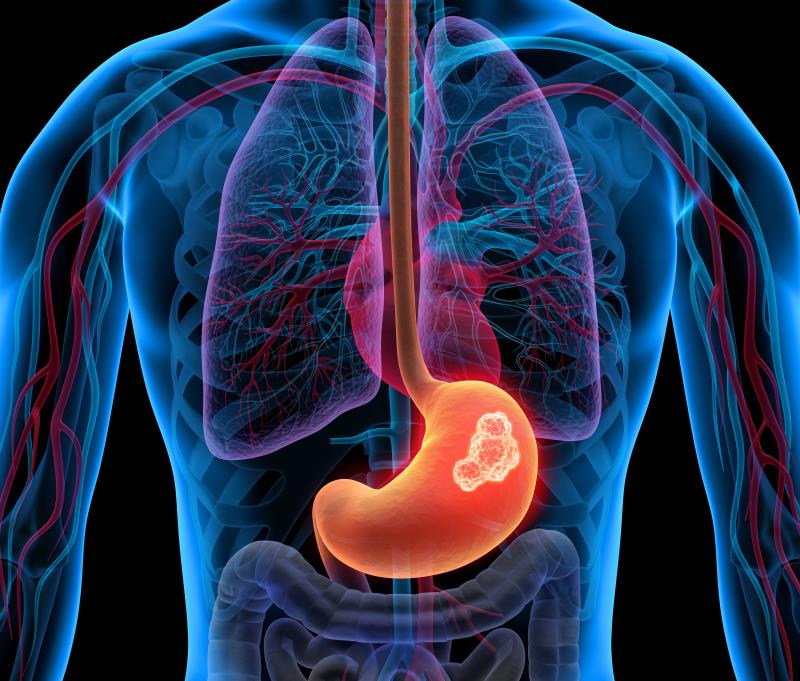Trastuzumab deruxtecan improves treatment outcomes in HER2-positive gastric cancer





Treatment with trastuzumab deruxtecan significantly improves objective response rate (ORR) and overall survival (OS) among patients with HER2-positive advanced gastric cancer, according to the DESTINY-Gastric01* study.
The researchers conducted an open-label, multicentre (48 sites in Japan and 18 sites in South Korea), phase II trial involving 187 patients with HER2-positive advanced gastric cancer or gastroesophageal adenocarcinoma that had progressed after receiving ≥2 previous therapies (eg, fluoropyrimidine and trastuzumab). Participants were randomized to receive either trastuzumab deruxtecan 6.4 mg/kg of body weight every 3 weeks (n=125; median age 65 years) or physician’s choice of chemotherapy** (n=62; median age 66 years). Patients continued treatment until disease progression, unacceptable adverse events, or study withdrawal. [N Engl J Med 2020;382:2419-2430]
As assessed by independent central review, ORR was significantly higher in patients treated with trastuzumab deruxtecan compared with physician’s choice of chemotherapy (51 percent vs 14 percent; p<0.001), with more trastuzumab deruxtecan than chemotherapy recipients achieving a confirmed objective response lasting ≥4 weeks (43 percent vs 12 percent).
The median duration of confirmed objective response was longer in the trastuzumab deruxtecan group than in the physician’s choice group (11.3 vs 3.9 months).
Patients who received trastuzumab deruxtecan also had a significantly longer OS (median 12.5 vs 8.4 months; hazard ratio [HR], 0.59; p=0.01), which crossed the prespecified O’Brien-Fleming boundary of 0.0202 based on the number of deaths, and progression-free survival (median 5.6 vs 3.5 months; HR, 0.47) than those who received physician’s choice of chemotherapy.
In a prespecified subgroup analysis of patients with high-level HER2-positive disease (score of 3+ on immunohistochemical analysis or score of 2+ with positive results on in situ hybridization), more trastuzumab deruxtecan than physician’s choice of chemotherapy recipients achieved an objective response (58 percent vs 29 percent). “However, the small number of patients in this subgroup makes definitive conclusions difficult,” the researchers noted.
Decreased neutrophil (51 percent vs 24 percent), anaemia (38 percent vs 23 percent), and decreased white-cell count (21 percent vs 11 percent) were the most common grade ≥3 adverse events (AEs) reported in the trastuzumab deruxtecan vs the physician’s choice of chemotherapy groups.
Twelve patients in the trastuzumab deruxtecan group reported drug-related interstitial lung disease or pneumonitis, compared with none in the physician’s choice of chemotherapy group. “[These notable AEs in the trastuzumab deruxtecan arm] were [actively] managed by appropriate dose reduction or interruption,” said the researchers.
“Although the number of patients in this phase II trial was relatively small, … treatment with trastuzumab deruxtecan can led to a significantly higher percentage of patients with an objective response, … [and] was adequately powered to detect prolonged OS under the prespecified statistical hypotheses … among patients with HER2-positive, advanced gastric or gastroesophageal junction cancer,” they concluded.
“A single-group, phase II trial is underway in the US and Europe to evaluate trastuzumab deruxtecan in the context of second-line therapy (after the receipt of first-line trastuzumab),” they added.
*DESTINY-Gastric01: DS-8201a in human epidermal growth factor receptor 2 (HER2)-expressing gastric cancer
**Chemotherapy: Irinotecan 150 mg/m2 of body-surface area every 2 weeks (n=55) or paclitaxel 80 mg/m2 on days 1, 8, and 15 every 4 weeks (n=7)